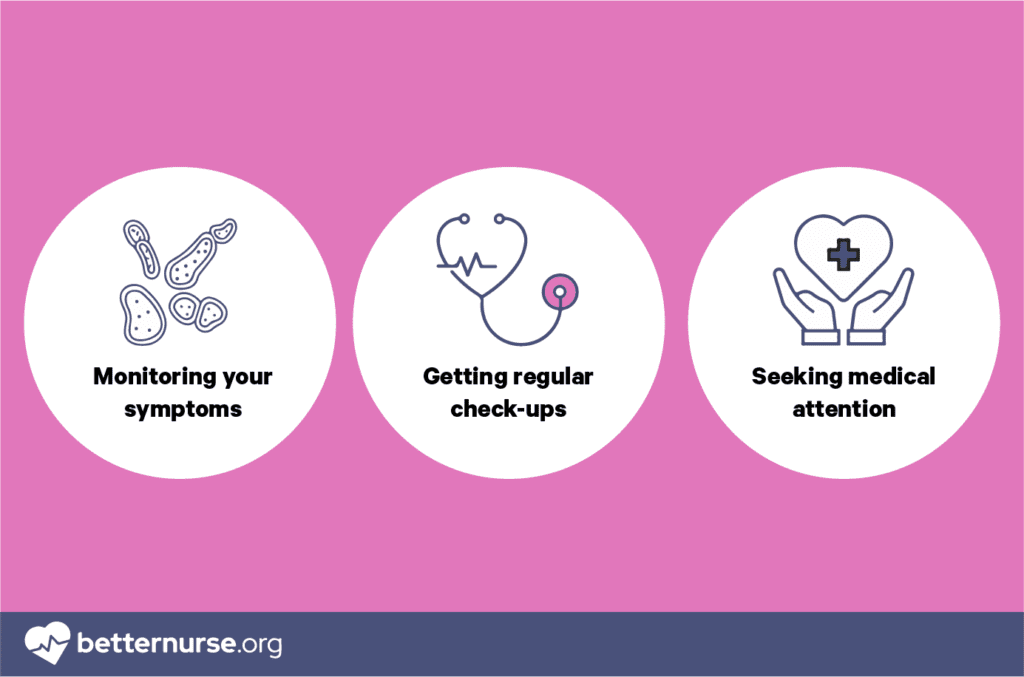Incorporating essential tips for night-shift nursing, such as prioritizing sleep, maintaining a healthy diet, and practicing self-care, can significantly improve a nurse’s performance, overall health, and well-being during late hours in a challenging healthcare environment.
Working the night shift can be a challenging experience for nurses. It can disrupt their sleep patterns, social life, and even their overall health. However, nurses can survive and thrive during the night shift with the right strategies and mindset.
This article will discuss 17 essential tips that can help nurses navigate the night shift, manage their workload, and maintain their well-being. These tips are based on practical insights and advice from experienced nurses and experts in the field.
Takeaway
Nurses can enhance their ability to remain attentive, concentrated, and adaptable during their night shifts by adopting certain strategies and techniques.
1. Set a Schedule and Stick With It
Establishing and maintaining a regular schedule is paramount for nurses who work the night shift. Adhering to a consistent routine for sleeping, eating, and physical activity allows the body to adapt more effectively to the demands of overnight work.
By sticking with a structured schedule, you can cultivate a sense of predictability and stability in an environment that can be turbulent, resulting in improved physical and mental well-being.
2. Give Yourself Time To Adjust
Transitioning to the night shift can be a significant change for nurses, as it requires a complete reversal of their daily routines. It is essential to give yourself time to adjust to this new schedule in order to maintain your health, well-being, and job performance. Keep in mind that everyone’s adaptation period may vary, but most individuals can expect to take a few weeks to fully adapt.
During this adjustment phase, it’s crucial to listen to your body and recognize any signs of fatigue, sleepiness, or stress. Be patient with yourself, and don’t expect to adjust overnight. Gradually transition to your new sleep schedule by adjusting your bedtime and wake time in increments. This will allow your body’s internal clock to adapt more smoothly.
Remember, it’s essential to prioritize self-care during this period. By giving yourself time to adjust and adopting healthy habits, you can successfully adapt to working the night shift and continue providing exceptional care to your patients.
3. Keep Moving at Night
As a nurse working the night shift, it’s easy to become sedentary and feel sluggish during the quiet hours of the night. However, keeping moving can help you stay alert and focused during the shift.
Regular movement can prevent physical aches and pains associated with sitting or standing in the same position for too long. It also helps you stay energized and focused throughout your shift, improving patient care and overall job satisfaction.
4. Anticipate the Morning Rush
During the night shift, it’s easy to get caught up in the quiet routine and forget that the end of your shift will likely be the busiest time. Planning and prioritizing your tasks during the quieter hours is essential to avoid feeling overwhelmed when the morning shift arrives.
Make sure to check in with patients, complete documentation, and prepare handoff reports well before the end of your shift.
5. Keep a Consistent Meal Schedule
With irregular meal breaks and limited options for healthy food, it’s easy to fall into unhealthy eating patterns, such as snacking on junk food or skipping meals altogether.
However, by planning and packing healthy snacks and meals, you can maintain consistent energy levels and avoid the adverse effects of a poor diet. Try to eat balanced meals regularly throughout your shift, and avoid heavy or spicy food that may disrupt your sleep after work.
6. Eat Healthy Food and Stay Hydrated

Dehydration can lead to fatigue and decreased cognitive function, making it challenging to provide the best care for patients. Similarly, a poor diet can lead to energy crashes and an inability to concentrate on tasks.
Choose healthy, nutrient-dense foods that provide sustained energy throughout your shift, such as fresh fruits and vegetables, lean proteins, and complex carbohydrates. Keep a water bottle handy and take regular sips throughout the night.
7. Make Friends With Your Night-Shift Colleagues
Working during the night can feel isolating and lonely, but connecting with your colleagues can provide a sense of camaraderie and support.
Chatting and socializing during breaks or before and after shifts can help you feel more connected to your workplace and reduce stress. In addition, having close relationships with your colleagues can help you work more efficiently, as you can rely on each other for help or advice.
8. Adjust Your Caffeine Intake
Caffeine can offer a temporary energy surge, but it may also interfere with sleep patterns and heighten feelings of anxiety or restlessness. As such, it’s crucial to be aware of your caffeine intake and the timing of your consumption.
Aim to restrict your caffeine consumption to the earlier portion of your shift, and as the night progresses, consider opting for decaffeinated beverages or non-caffeinated alternatives. This approach will help you minimize potential sleep disturbances during your daytime rest and contribute to a smoother adaptation to your night-shift schedule.
9. Take Breaks
Working through the night can be mentally and physically exhausting, and taking regular breaks can help prevent burnout and promote better overall health.
Even short breaks can help you refocus and improve your productivity, allowing you to provide better patient care. So, use your breaks to rest, eat, or engage in activities that help you recharge and feel refreshed.
10. Set Boundaries
When working the night shift, it’s essential to set clear boundaries and communicate them to your colleagues so that you can prioritize your needs and prevent burnout. This may include limiting the amount of overtime you work, avoiding work-related tasks outside of work hours, and limiting how much time you spend checking work-related messages or emails.
11. Create a Sleep Space That Works for You
Achieving restorative sleep during daylight hours can be difficult due to sunlight and noise disturbances. To enhance your sleep quality, it’s crucial to design a sleep environment tailored to your needs.
Invest in blackout curtains to block out sunlight, utilize white-noise machines or earplugs to drown out external sounds, and ensure your bedroom’s temperature remains comfortable.
By optimizing your sleep space, you’ll be better equipped to enjoy restful sleep during the day, thus improving your overall well-being and job performance on the night shift.
12. Make Exercise a Consistent Part of Your Routine
Working during the night can disrupt your sleep patterns and lead to feelings of fatigue and exhaustion, but regular exercise can help boost your energy levels and improve your overall health. Try to find time to exercise before or after your shifts, or incorporate short bursts of physical activity into your workday. Even short bouts of exercise can help improve your mood, cardiovascular health, and sleep quality.
13. Monitor Your Health

Night shifts can disrupt sleep patterns, impact your immune system, and increase your risk of chronic health conditions. It’s essential to be proactive about your health by monitoring your symptoms, getting regular check-ups, and seeking medical attention when necessary.
Please pay attention to signs of fatigue, stress, or illness, and take steps to address them before they become more serious.
14. Adjust Your Medications
Adjusting your medications is an important aspect of surviving the night shift as a nurse. Some medications can make you feel drowsy, which can be particularly challenging when you’re trying to stay alert and focused during the night.
Speak with your healthcare provider about adjusting the timing of your medication regimen. This might mean taking certain medications after your night shift to help you get better sleep during the day.
By being proactive about managing your medications, you can help ensure that you have the energy and focus you need to provide optimal care for your patients during your night shifts.
15. Maintain Personal Relationships

Maintaining personal relationships can help reduce isolation and loneliness and improve your overall well-being. Though it may be difficult when working the night shift, it’s essential to prioritize personal relationships and make time for socializing outside of work. This may involve scheduling regular phone calls or video chats with loved ones or coordinating social activities during your off hours.
16. Drive Home Safely
It’s essential to prioritize your safety by ensuring you are well-rested and alert before getting behind the wheel. Avoid driving if you feel too tired, and consider taking public transportation or arranging a ride with a coworker or loved one if necessary.
If you do drive, take breaks, stretch your legs to stay alert, and avoid distractions like texting or phone calls while on the road.
17. Remember Your Self-Care
Self-care is not just a trendy term; it’s a crucial aspect of surviving the night shift as a nurse. When working during the night, your body is naturally programmed to sleep, and it can be challenging to stay alert and focused. However, by prioritizing self-care, you can take proactive steps to maintain your well-being and mitigate the risks of burnout or exhaustion.
This includes engaging in regular exercise, mindfulness practices, and healthy eating habits. It’s also essential to take frequent breaks and prioritize rest, even if it’s only a few minutes to recharge.
As a nurse, taking care of yourself isn’t selfish; it’s necessary for your patients and your long-term career success. By making self-care a priority, you’ll be able to show up as your best self, both on and off the job.
Conclusion
Working the night shift as a nurse can be challenging, but by implementing these 17 essential tips, you can survive and thrive. By prioritizing your physical and emotional health, maintaining healthy habits, and taking care of yourself both on and off the job, you can provide high-quality care to your patients while maintaining your well-being.
With these important tips in mind, nurses can feel confident and empowered to tackle the demands of the night shift and succeed in their roles.

Nurse Luke is a CRNA who specializes in Nursing content and still enjoys a very busy career with Locum, Per Diem and Travel nursing in the greater midwest. He has over 25 years of experience in the healthcare field and received his CRNA masters degree from the Mayo Clinic School of Healthcare. He is passionate about helping nurses explore the options of becoming a travel nurse as well as spending time with his Family.



